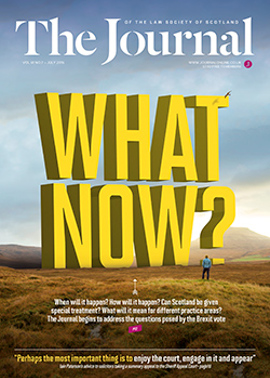To boldly go...

Optimism is a kind of heart stimulant – the digitalis of failure. (Elbert Hubbard)
The place where optimism most flourishes is the lunatic asylum. (Havelock Ellis)
A firm outside the UK I have worked with for the last two years advises its government in the healthcare and social work sectors. The work is divided into discrete areas, and there is one catch-all category known as “Miscellaneous Madness”. What a brilliant description of the prevailing atmosphere. As I write, there are reports of Dr Victoria Bateman, a Cambridge economics don, arriving at a departmental meeting the day after the EU vote, wearing nothing but a placard which read, “BREXIT LEAVES BRITAIN NAKED”. The chair of the meeting glanced at her and then remarked to his secretary, “I think we could do with some cups for the coffee,” displaying a sang-froid and focus on the essentials that one hopes will be the hallmark of negotiations.
Times of uncertainty are profoundly challenging to business leaders, who have to cope with their personal anxieties, give a clear lead to the troops, and plot the course ahead. Above all, individuals and organisations need to show resilience. Its most important ingredient is the quality of optimism. As Michael Schier, Professor of Psychology at Carnegie Mellon University, says: “Optimists are not Pollyannas; they are problem solvers who try to improve the situation. If it can’t be altered, they are more likely than pessimists to accept that reality and move on. Pessimists, on the other hand, tend to deny, avoid, and distort the problems they confront, and dwell on their negative feelings. It’s easy to see why pessimists don’t do so well compared to optimists.”
Lawyers are not natural optimists. By nature and calling, we are cautious, risk-averse and troubled by the thought of failure. So how best do we cope?
The best kind of pessimism
“Optimistic” and “pessimistic” do not just describe how we expect things to turn out, but how we believe adversity has arisen. Pessimists have a tendency to feel powerless, and that little is changeable. By contrast, optimists believe in their power to influence their circumstances and by their own efforts turn things around. All the evidence is that these attitudes are self-fulfilling. In a fascinating experiment, the world’s leading authority in this field, Professor Martin Seligman, asked swimmers to swim their best stroke and told them their times were lower than they actually were. In repeat sessions, swimmers who saw themselves as optimists swam very similar times. Those who were pessimists swam more slowly.
But this is not to say that optimism is always the better outlook. The best mindset is thought by experts not to be pure optimism, but “defensive pessimism”. Defensive pessimists worry about negative outcomes, but use that worry as motivation to beat the odds.
The stories we tell ourselves about why bad things happen make a significant difference to how we deal with them. And though these stories have been profoundly influenced by our upbringing and the experiences life has brought our way, they are never set in cement. Optimism is not a trait, it is a skill; and like all skills, it can be learned. As Seligman says, “The optimist’s outlook on failure can be summarized as ‘What happened was an unlucky situation (not personal), and really just a setback (not permanent) for this one, of many, goals (not pervasive)’.”
Where opportunity lies
It is not Pollyanna-ish to believe following the vote for Brexit that even if there is a short-term slowdown in deal and investment activity, UK law firms will continue to thrive. Uncertainty creates the need for clarity and shrewd judgment. This is lawyers’ basic currency. Entrepreneurs use uncertainty to seek out opportunities, and need lawyers to help realise them. Businesses and individuals will look urgently at how best they can protect themselves, and those who depend on them. Lawyers will be their indispensable allies. The UK has economic clout, deep reserves of talented people, advanced infrastructure, the world’s leading language, and as we have just seen in technicolor, a robust democracy under the rule of law. All of these will continue to make us a magnet for global business.
On the night of the vote, I spent the small hours exchanging texts with the head of a leading firm. At 4am he was despondent. At 8am, after a few hours’ sleep, he texted me: “The decision’s made, now we have to get on with it.” Later that day, he sent a message of exemplary reassurance to the whole firm. There is the template for enduring success: realism that the sea may be stormy, but confidence that by making full use of our skills, assets and imagination we can navigate to a bright future.
In this issue
- Environmental law outside the EU
- 2014 revisited: championing Scotland in the EU
- “Justice for sale”
- After the fling
- Traps for the unwary
- Reading for pleasure
- Opinion: Rory Scothorne
- Book reviews
- Profile
- President's column
- Leading by example
- People on the move
- Brexit: a full menu
- Appeal of the new court
- Hostility enacted
- Socially motivated
- Back on the case?
- Send the client in?
- What does Brexit mean for planning and environmental law?
- Immigration meets licensing: not a marriage made in heaven
- Post-Brexit taxation: less of a certainty?
- Scottish Solicitors' Discipline Tribunal
- Community right and commercial sale
- Plane language
- Law reform roundup
- SSDT has a new clerk
- Covered by the terms?
- Ask Ash
- To boldly go...
- Hacking into the law
- Paralegal pointers






